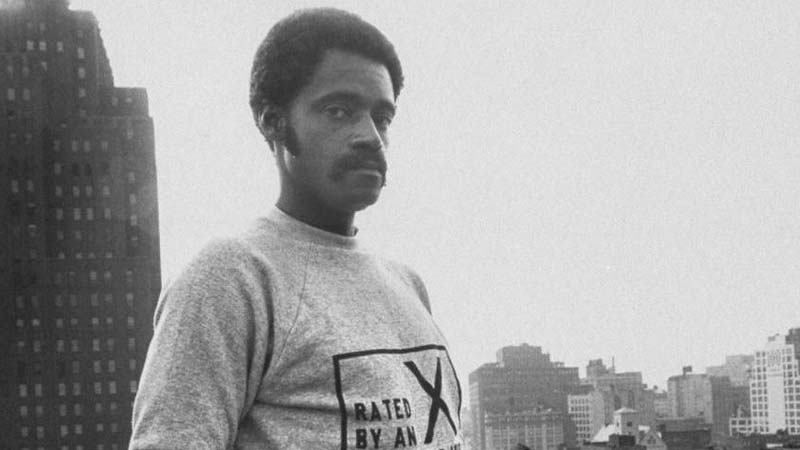
Melvin Van Peebles
Van Peebles was born in Chicago, Illinois to a black tailor. He joined the Air Force in 1954, thirteen days after graduating (B.A., 1953) from Ohio Wesleyan University, staying for three and a half years. He married a German woman, Maria Marx. They lived in Mexico for a brief period, where he painted portraits, before coming back to the United States, where he started driving cable cars in San Francisco.
Van Peebles began writing about his experiences as a cable car driver. What evolved from an initially small article and a series of photographs was Van Peebles’ first book, The Big Heart.
One day, a passenger suggested that Van Peebles should become a filmmaker. He shot his first short film, Pickup Men for Herrick, in 1957. He made two more short films during the same period. According to Van Peebles, “I thought they were features. Each one turned out to be eleven minutes long. I was trying to do features. I knew nothing.” As Van Peebles learned more about the filmmaking process, he found out that “I could make a feature for five hundred dollars. That was the cost of ninety minutes of film. I didn’t know a thing about shooting a film sixteen to one or ten to one or none of that shit. Then I forgot you had to develop film. And I didn’t know you needed a work print. All I can say is that after I did one thing he would say, ‘Well, aren’t you gonna put sound on it?’ and I would go, ‘Oh shit!’ That’s all I could say.”
After Van Peebles completed his first short films, he took them with him to Hollywood to try to find work, but was unable to find anyone who wanted to hire him as a director. In New York City, Van Peebles met a man who saw his films and wanted to screen them in France. In 1959 the family went to the Netherlands, where he worked for the Dutch National Theater. The marriage dissolved, his wife and children went back to America, and Peebles was invited to Paris by Henri Langlois, founder of the Cinémathèque Française, on the strength of his short films. He learned French, and was hired to translate Mad magazine into French. He began to write plays in French, utilizing the sprechgesang form of songwriting, where the lyrics were spoken over the music. This style carried over to Van Peebles’ debut album, Brer Soul. He published four novels and one story collection in French and made another short film, Cinq cent balles (1965). It was here that he made his first feature length film, The Story of a Three-Day Pass (La Permission) (1968), which caught the attention of Hollywood producers who mistook him for a French auteur. His first Hollywood film was the 1970 Columbia Pictures comedy Watermelon Man, written by Herman Raucher. The movie told the story of a casually racist white man who suddenly wakes up black and finds himself alienated from his friends, family and job. In 1970 Van Peebles was also to direct filming of the Powder Ridge Rock Festival, which was banned by court injunction.
It was after the resulting bad experience directing Watermelon Man that Van Peebles became determined to have complete control over his next production, which became the groundbreaking Sweet Sweetback’s Baadasssss Song (1971), privately funded with his own money, and in part by a $50,000.00 loan from Bill Cosby. Van Peebles not only directed, scripted, and edited the film, but wrote the score and directed the marketing campaign. The film, which in the end grossed $10 million, was, among many others, acclaimed by the Black Panthers for its political resonance with the black struggle. His son Mario’s 2003 film BAADASSSSS! tells the story behind the making of Sweet Sweetback’s Baadasssss Song; father and son presented the film together as the Closing Night selection for Maryland Film Festival 2004.
In the 1980s, Van Peebles became an options trader on the American Stock Exchange while continuing to work in theater and film.
In 2005, it was announced that Van Peebles would collaborate with Madlib for a proposed double album titled Brer Soul Meets Quasimoto. However, nothing has been said about this project since it was announced.
In 2008, Van Peebles completed the film Confessionsofa Ex-Doofus-ItchyFooted Mutha, which was the Closing Night selection for Maryland Film Festival 2008, and appeared on All My Children as Melvin Woods, the father of Samuel Woods, a character portrayed by his son, Mario.
In 2009 Van Peebles became involved with a project to make Sweet Sweetback a musical. A preliminary version of this was staged at the Apollo on April 25–26, 2009. As well, he wrote and performed in a stage musical, Unmitigated Truth: Life, a Lavatory, Loves, and Ladies, which featured some of his previous songs as well as some new material.
In 2011, Van Peebles started doing shows in NYC with members of Burnt Sugar, under the name Melvin Van Peebles wid Laxative. Van Peebles has said that the band is called Laxative because they “make shit happen”. At least one of their shows have been listed as “must-sees” by a blogger from Time Out New York. In November, 2011, Melvin Van Peebles wid Laxative performed his song “Love, that’s America” at Zebulon Cafe Concert, two weeks after the venue showed the original video for this song involving Occupy Wall Street footage, which was uploaded to Youtube in October 2011.
On August 21, 2012, he distributed a new album, on vinyl only, called Nahh… Nahh Mofo. This album was distributed at his birthday celebration at Film Forum. On November 10, 2012, he released a video for the song Lilly Done The Zampoughi Every Time I Pulled Her Coattail to go with the album, which was announced on his Facebook page.
On May 5, 2013 he returned to the Film Forum for a screening of The Kid (1921) and was a judge at the Charlie Chaplin Dress-Alike Contest that was after the screening. He wore a bowler hat and baggy pants in honor of Charlie Chaplin.
In September 2013, Van Peebles made his public debut as a visual artist, as a part of a gallery featured called “eMerge 2.0: Melvin Van Peebles & Artists on the Cusp”. It features “Ex-Voto Monochrome (A Ghetto Mother’s Prayer),” one of many pieces of art he created to be on display in his home.

